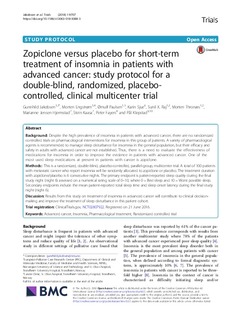Zopiclone versus placebo for short-term treatment of insomnia in patients with advanced cancer: study protocol for a double-blind, randomized, placebo-controlled, clinical multicenter trial
Jakobsen, Gunnhild; Engstrøm, Morten; Paulsen, Ørnulf; Sjue, Karin; Raj, Sunil Xavier; Thronæs, Morten; Hjermstad, Marianne Jensen; Kaasa, Stein; Fayers, Peter; Klepstad, Pål
Journal article, Peer reviewed
Published version

Åpne
Permanent lenke
http://hdl.handle.net/11250/2592318Utgivelsesdato
2018Metadata
Vis full innførselSamlinger
Originalversjon
10.1186/s13063-018-3088-3Sammendrag
Background
Despite the high prevalence of insomnia in patients with advanced cancer, there are no randomized controlled trials on pharmacological interventions for insomnia in this group of patients. A variety of pharmacological agents is recommended to manage sleep disturbance for insomnia in the general population, but their efficacy and safety in adults with advanced cancer are not established. Thus, there is a need to evaluate the effectiveness of medications for insomnia in order to improve the evidence in patients with advanced cancer. One of the most used sleep medications at present in patients with cancer is zopiclone.
Methods
This is a randomized, double-blind, placebo-controlled, parallel-group, multicenter trial. A total of 100 patients with metastatic cancer who report insomnia will be randomly allocated to zopiclone or placebo. The treatment duration with zopiclone/placebo is 6 consecutive nights. The primary endpoint is patient-reported sleep quality during the final study night (night 6) assessed on a numerical rating scale of 0–10, where 0 = Best sleep and 10 = Worst possible sleep. Secondary endpoints include the mean patient-reported total sleep time and sleep onset latency during the final study night (night 6).
Discussion
Results from this study on treatment of insomnia in advanced cancer will contribute to clinical decision-making and improve the treatment of sleep disturbance in this patient cohort.